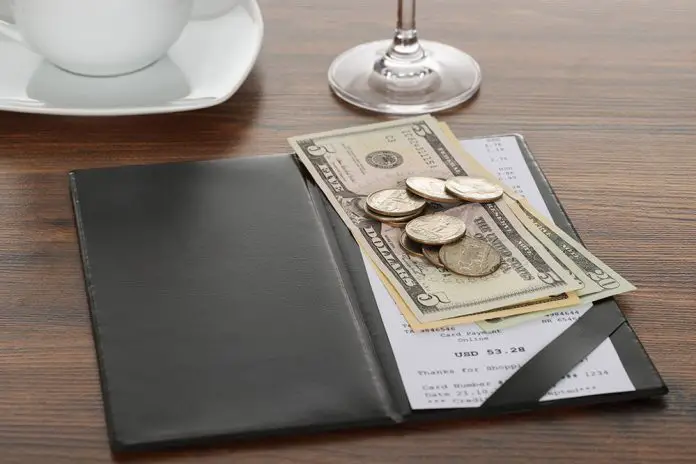The American tip culture is extremely uncomfortable and quite erroneous because it leads to infringement of servers and inconvenience to visitors, and that’s why.
Tipping is a Way to Share Wealth
Firstly, the culture of paying tips is based on the erroneous logic that restaurant visitors should “distribute their wealth” because they have money to eat in restaurants. According to this logic, each restaurant visitor should share part of his money not only with the owner but also with an ordinary employee. However, in practice, such a culture has long grown into a mandatory ritual, depriving the visitor of the opportunity to decide for himself. Of course, you can not leave a tip, but then you will feel remorse because you left the server without a part of his or her income.
Tips Do Not Value Service
Initially, tipping was conceived as a means to thank the server for a good and attentive service. You COULD leave a tip if you liked how you were served. Considering that young people usually worked as servers, you helped them in parallel and showed that efforts were rewarded. But today is not so. In some restaurants, you will be asked to pay 20% of tips for good service and 15% of tips for bad. That is, it is understood that you have to pay a tip regardless of whether you liked it or not. Even if the service was terrible, you are expected to pay a little less tip. This, in turn, kills staff motivation and the servers may not try to be as competitive as they know that they will still receive 10-15% of the order amount.
Tips Cut Servers’ Salaries
Tipping exists and this is a fact. And this fact encourages restaurant owners to pay less and still allows you to find servers. Why? Because despite the low salary, the server understands that a tip will bring him additional income. But this income will be firstly unofficial, and secondly unpredictable. On some days, the waiter can earn 200-300 and even $ 400 by the tip, especially inexpensive restaurants. But on other days, the tip amount may be 10-15 dollars. As a result, the server never knows how much he will earn and is forced to constantly think about his income.
Tipping Does Not Depend on Diligence, But on the Order Price
Suppose you ordered juice, and your friend has three large steaks. The server brought first the juice, and then three steaks at once. Did he make more effort to bring three steaks? No. But is it expected that your friend will leave a substantial amount as a tip? Yes. This is because the price of his order was much higher than the price of your juice. As a result, tips are not based on effort but are based on the order price.
Servers Forced To Offer More Expensive Dishes
The waiter is not to blame for the fact that the culture is built on the principle of “pay a small salary, let me get a tip.” But the server wants to make money. Knowing what is described in the previous paragraph, he will try to offer you a more expensive dish, because he knows that the larger the amount, in the end, the more tips he will receive. As a result, you pay not only 15-20% of tips, but you can also pay them for an imposed dish.
You Can Punish by Not Giving a Tips
Once they brought me a tasteless pizza and I punished the restaurant without leaving a tip in it. Familiar situation? But if you think about it, then my punishment did not make any sense. Who is to blame for the fact that my pizza was tasteless? I think the cook who cooked it, but the cook receives a salary for this directly, without any tricks. It turns out, trying to punish the cook, I just left the server without part of his salary. And this is one of the worst things related to tip culture in the US. You are offered to recoup and punish for bad food (and as a rule in a restaurant the problem is precisely in food or drinks and very rarely in outright poor service) of a guy or a girl serving food. This is a tricky psychological trick. You “punish” the server without giving him or her a tip and thereby get rid of part of the negative about the restaurant in which you served a bad dish. As a result, those who really screwed up are not punished, but not guilty are.
Tips Transfer Salary Dispute from Employer to Client
Servers can only be paid at $ 2.13 per hour, instead of $ 7.25 at the federal minimum. This happens because another 5.12 dollars is expected to be earned by the tip. That is, 70.6% of the employee’s wages should be received in the form of tips. In most sectors of the economy, wage issues are discussed between the employee and the employer, which leads to consensus. But in the case of professions where tips make up the majority of income, the employee cannot discuss his salary with the employer and is forced to shift his attention to the client. $ 2.13 an hour is not enough to live a month, and this becomes one of the arguments for waiters who often start to demand tips from the client, arguing that they cannot survive without them. This creates an unfair situation when customers are actually responsible for the sever’s salary.
Tips Reduce Price Transparency
People who often eat in restaurants know that they need to add 15-20% to the tip to the amount of their order. However, many, when making an order, do not think about how much it will actually cost. Seeing the cost of a meal at $ 15, I don’t think that in reality, I will pay $ 17-18. This situation makes the choice of dishes more difficult, as well as budget planning. In fact, restaurant owners create a trap in which the client thinks he pays less than what the food actually costs.






